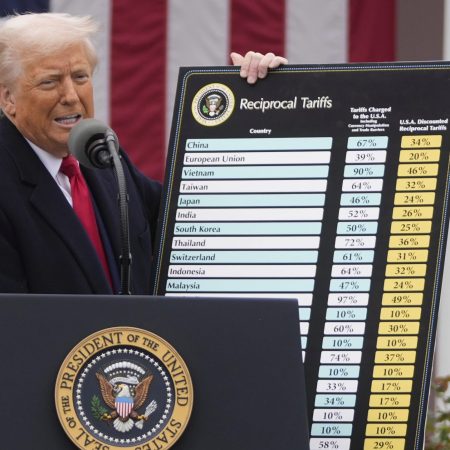Small business owners ask Trump for tariff relief
Business leaders say President Trump’s tariffs on various countries and products are creating a high level of uncertainty for companies.
That appears especially true for small business owners who often operate with razor-thin profit margins.
A national coalition of CEO’s called Small Business for America’s Future estimates owners of smaller firms account for the vast majority of U.S. imports, the kind directly impacted by tariffs.
The group recently drafted a letter to President Trump and other officials claiming tariffs place a disproportionate burden on small businesses and are creating a crisis for owners.
That includes Farmington Hills, MI-based Blitz Proto, a company that specializes in helping customers bring ideas from design and engineering to production.
Blitz Proto CEO Carrin Harris says tariffs are making it hard for her company to survive.
Listen: Small business owners ask Trump for tariff relief
The following interview has been edited for clarity and length.
Carrin Harris: Blitz Proto is a small, three-person team. We’re focused on bringing innovative ideas to life. We help companies make prototypes from toys to medical devices and auto parts. Most of our prototypes involve electronics. That’s why we are having difficulty with the tariffs right now. Most of the electronic parts come from China. But we also do machining. So, the cost of all materials for machining has gone up. Aluminum, steel, everything’s going up quite a bit.
Quinn Klinefelter, WDET News: Have you been able to absorb some of the costs from the tariffs? Or do you have to pass the full cost on to consumers?
CH: We do work on very small margins. We have done what we can to absorb the cost. But for the most part, we are passing it on to the customers.
QK: How is that going over?
CH: So far, it has been very difficult. Many of our customers come to us with very small budgets and they can’t afford the additional cost to make their product. So, we have lost some opportunities this year due to the increased costs that we’re passing on.
QK: There’s been reports that some suppliers are demanding additional payments to cover tariff-related costs they say they were not expecting. Has that happened with your business?
CH: Yes, it has. We had placed some orders back in December. Then we received communication from our vendors telling us the cost had gone up. They’re attempting to absorb the costs as well but they had to pass some additional fees on to us to account for the tariffs and duties and additional shipping costs.
QK: How does that affect your business? I imagine it impacts not only costs but also quoting people what you might have to charge them or the time frame for when you’ll be able to deliver a product?
CH: Yes, it has. We have changed our policies internally this year. Our quotes are now expiring in one week rather than one month. And a lot of our lead times are being pushed out because the shipping times are much longer.
QK: It must be difficult to form a business plan with that kind of a situation.
CH: It has been extremely difficult. I’m doing the best that I can to assure our customers that we are exploring alternative vendors. We’re looking into more suppliers here in the United States, although costs for items coming from the United States tend to be quite a bit higher, sometimes three times the cost.
QK: You are one of the owners included in the letter sent to President Trump and other officials regarding tariffs and how they’re affecting small business. President Trump has said over and over that he loves tariffs. But he’s also proposed huge tariffs and then reduced them and then added others. Given all that, how realistic do you think it might be that he could reverse course on any of these tariffs, especially ones dealing with electronics from countries like China?
CH: It does sound like a possibility. But it’s pretty unpredictable. I’m hoping that he’ll at least choose and stick with a tariff rate so that we can anticipate better. Because we quote customers ahead of time, sometimes months ahead of time, so they can plan their budgets. If they’re ready to start a project and the cost has skyrocketed in the meantime, they usually have to scrap the project.
QK: The president said earlier this year that his use of tariffs could mean, for example, that maybe someone can only buy two dolls for a child this year for Christmas instead of 30. That’s as he says he’s bringing manufacturing back to the U.S. For you, whose company actually makes prototypes for toys, among other things, what do those comments mean to you?
CH: It really means the supplier that wants to create a new toy is probably not going to do it. We are a very small business among many small businesses and these tariffs are threatening our livelihood. We already are working with almost no capital. So I don’t see how we can sustain this in the long run. I’d like to see more consistency.
QK: How long have you had your business going and how has it been doing?
CH: We started in mid-2022. It’s done pretty well up until the tariffs were put in place. We had really good outlooks for this year. We’ve formed a lot more customer relationships and have had a lot of new opportunities this year. Unfortunately, a lot of those customers have held back from putting in orders that they planned on making with us this year. I am sure that’s due to the fluctuating cost.
QK: And not being a huge corporation, I imagine you don’t have the extra assets or resources available to help tide you over the way that a large company might?
CH: We’ve actually had some suppliers tell us that big corporations came in and bought up all of their stock. So they wouldn’t actually honor the orders that we’d already put in and paid for.
QK: How can they do that if you already paid for them?
CH: That’s a good question. They didn’t really have any answers for us
Trusted, accurate, up-to-date.
WDET strives to make our journalism accessible to everyone. As a public media institution, we maintain our journalistic integrity through independent support from readers like you. If you value WDET as your source of news, music and conversation, please make a gift today.Donate today »
The post Small business owners ask Trump for tariff relief appeared first on WDET 101.9 FM.




